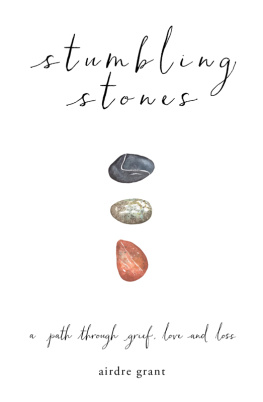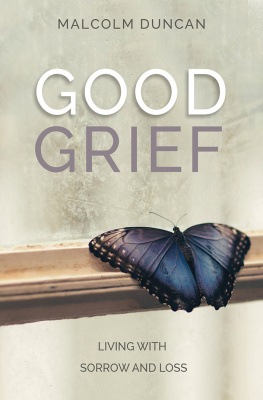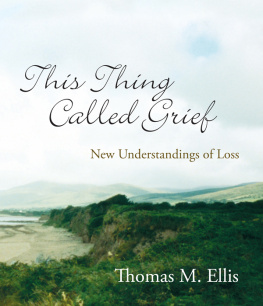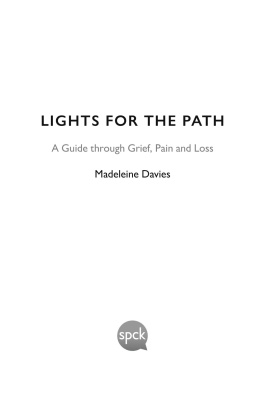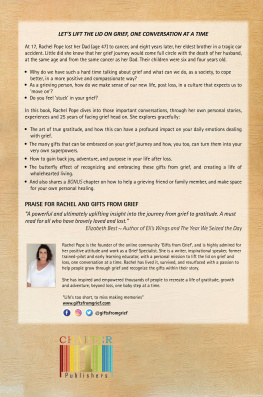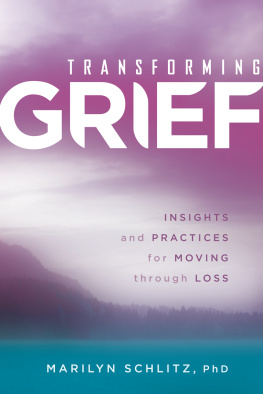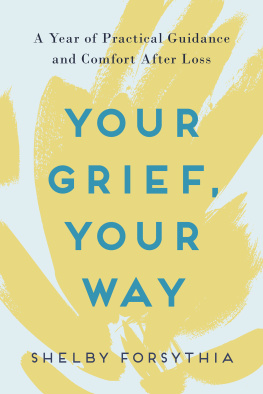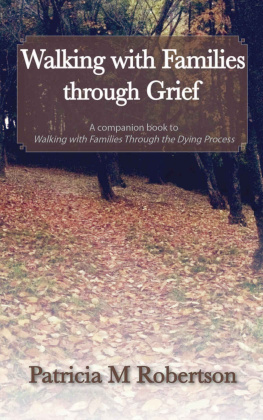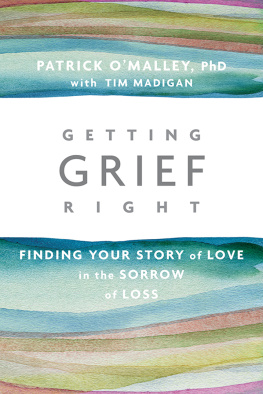

To Angus, of course
Contents

I t was a sunny Sunday afternoon when the phone range. I was idly wondering if I had the will to vacuum. The siren call of the phone offered a reprieve. It was my big brother calling to tell me that my twin brother, Angus, was dead. Thats all he said, Hes dead.
I fell spinning into an abyss of pain and darkness. I shook and I wept. Food repelledme. I couldnt sit still let alone drive. Sleep was ragged. My skin felt paper thinand my sensitivity was acute. The pain was unremitting. CS Lewis said in A GriefObserved that the death of a beloved is an amputation. For a twin its worse. I couldntmove. My dog came and sat next to me.
Alone in his flat, Angus died when an ulcer had burst.
It wasnt my first encounter with the sharp pain of grief and loss, but I forgotit and had been living with the blithe arrogance of everyday life. My concerns upuntil that moment were parking, work, bills. I didnt think about pain. Brutalitiesand wars in faraway countries didnt really affect me. I had forgotten how griefwalks alongside, sits on your shoulders. At any time your proud little house of cardscan tumble down.
Years ago I had confidently asserted that pain was an ally. I didnt remember howit strips you back to your core, naked for all to see, defenceless, wounded and raw.Time tricked me into thinking I had learned the strong, driving nature of this lesson.I realise now this was foolishness.
I did remember how people behaved toward the bereaved, though. Their awkwardnessand muffled kindness. The way they changed around me. Some ran a million miles, asif I were carrying a terrifying infection. Others drew close. Too close. Treatingme as if I were ill, they patted my arm, looked deeply into my eyes and whisperedin voices dripping with concern, Are you okay? No, Im not, I would think, pullingaway. Please dont make my pain your story. Leave me alone. It was hard to receivekindness and even harder from friends than from strangers.
I was given curious gifts in that ragged time: sure knowledge of what I would andwouldnt do, crystal-clear knowing of what really mattered. The trivialities of lifewere exposed baldly. Peoples vanities shone brightly. I was released from worryingabout what others thought of me.
The whole business of grief and loss is a mess. It can start badly and end who knowshow or when. It doesnt have to be about death. It can be about loss of a friendship,a pet, a dream of you, vitality, country, hair, strength. Its not always as straightforwardas death, where the loss is there for all to see. What about those mysterious unresolvedlosses? Babies adopted out in secrecy, the end of a forbidden relationship?
Whatever way you come to it, the journey through grief is long and unpredictable.The only way through it is through it. There are no shortcuts. The more you stepinto it, the better. Avoidance only brings it back more strongly later on. Betterto lash yourself to the mast and sail into the storm. What choice do you have? Andafter others have tired of you and gone back to their lives, you still have to sailthat sea. Things happen on that journey. Friendships are formed and gifts arrivefrom unexpected sources. A friend told me once, You get the help you need, not whenyou think you need it, but when you really need it. She was right.
Dear God, I miss my twin. Its called being twinless and I am told there are supportgroups, even conferences. Only a twin understands how awful it is when your kindredspirit is gone. For the first time in my life I was really alone. And yet, I feelhim around me; I know he watches over me.
Just as I was getting a wee bit better, my dog died. With sadness, I buried him inmy garden.
Then my father died. Now the descent accelerated. It had started when I visited himat the nursing home and found him asleep on the chair. He started at my touch andsaid, Dear, it is good to see you. It smote my heart.
With encouragement, I managed to get him into a wheelchair and out to the car. Aftersome painful hefting and shoving we were off. I drove to a nearby park with levelpaths where I could wheel him to look at the ocean inlet, the sea glistening on themudflats.
He was so frail. Paper skin, bony hands, cold feet in felt slippers; he sat in semi-regalsplendour with his Russian hat and a warm blanket across scrawny knees. Once a powerfulman, one that I feared, he was now fragile and diminished. A husk. Nearly deaf, nearlyblind, with difficulty moving, he had suffered so much lossdignity, privacy, vigourand influence. All were gone. He had been banned from taking alcohol, which he loved,so I plied him cheerfully with brandy and soda, and he sipped it, gratefully, ashe contemplated the sea and the sky.
I gave him his favourite sweets to suck on. Oh, he said with deep gratitude, theseare good.
We remained there in the afternoon sun, watching the tide slowly creep up until Irealised he had gone to sleep and it was time to go back.
Dear, he whispered again, it is good to see you.
The next day, when I visited,he was asleep on the bed and I didnt want to disturb him. I left and went to myfaraway home. I never saw him alive again. As I travelled home, he died.
I did see him one more time, lying in his coffin. I found it very reassuring to sitnext to the body and talk to him. I dont get to see many dead bodies. They are socold, so very dead, and you can really tell the light has gone out.
I had reached the point where it was all too overwhelming for me, so I set out ona pilgrimage. I would leave Australia and go far away, to England, Scotland, Indiaand New Zealand. Places I loved and where I knew I could hide and heal. I was ashamedof my inability to cope and was useless at all the paperwork and administration Ifaced at work. I couldnt see the point. I couldnt accept the sympathy of friendsand the pity of colleagues. I wanted to leave behind pain and to find new understandingsto ease my aching heart. I knew that, in order to go forward, I would, I had, togo back. I would, inevitably, have to address everything in the past that I had hopedto leave behind. This would happen now that everything had been tossed up.
These endings were my beginning.
I n olden days, when maps were drawn and the cartographers didns know what was in the empty space, they would write Here Be Dragons to signify unknown and possiblydangerous territory. Death is like that for many of usunknown and dangerous territory.It is unmapped. We dont know the way and we dont know what we might encounter.We are afraid of dragons.
One way, I think, to temper your encounter with the dragon of death is to sit withthe body of the deceased. I have found it unexpectedly consoling and reassuring.
When my twin brother died I did not think I could face life with any kind of competenceever again. I went to see his body. I looked at his strangely made-up and composedface. I touched him. He was very cold. My body felt shrivelled up, clenched withpain, anger, despair.
I pulled up a chair next to him and began to talk through my tears, asking how hecould leave me, how was I to live without him. And as I sat there the strangest thinghappened. A deep and comprehensive sweetness came from him directly into my heart.The longer I sat, the stronger the sensation became. The distress and pain subsidedin the face of this flow of love. I knew, in my twinly heart, that he was tellingme he was fine and happy, and to not worry anymore; that I was to trust he was allright. He had been unhappy for so long, but was no longer in pain and burdened bymisery. After that I could manage the funeral, the eulogy, the tea and sandwiches.I could manage it all, as I felt his presence alongside.
Next page
